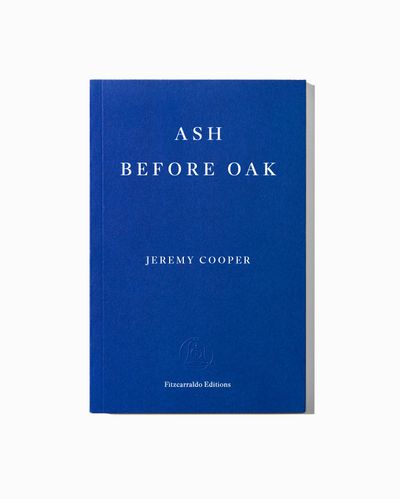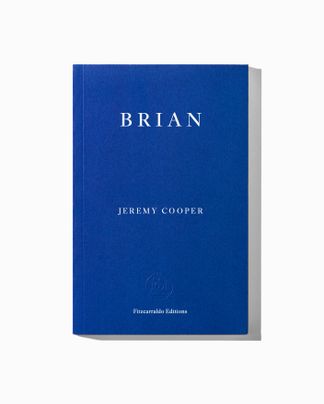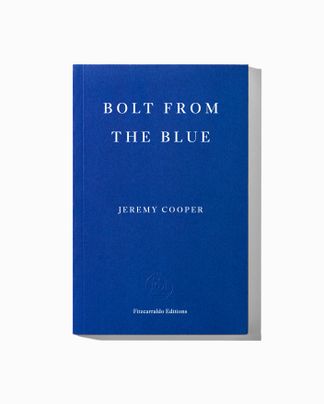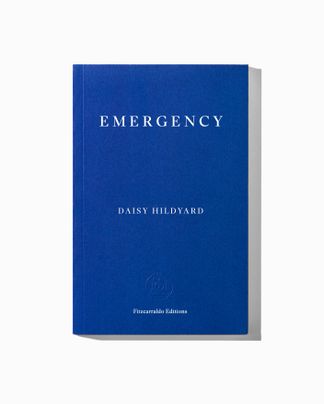Ash before Oak is a novel in the form of a fictional journal written by a solitary man on a secluded Somerset estate. Ostensibly a nature diary, chronicling the narrator’s interest in the local flora and fauna and the passing of the seasons, Ash before Oak is also the story of a breakdown told slantwise, and of the narrator’s subsequent recovery through his reengagement with the world around him. Written in prose that is as precise as it is beautiful, winner of the 2018 Fitzcarraldo Editions Novel Prize, Jeremy Cooper’s first novel in over a decade is a stunning investigation of the fragility, beauty and strangeness of life.

Ash before Oak
French paperback with flaps, 536 pages
Published 17 April 2019
Ash before Oak
24 December
Today I did a beautiful thing: built a rose arch from timber I had first felled and trimmed. My work is not in itself beautiful, but the act of doing it was, the replacement of a fallen frame, an old rose set to prosper.
In the afternoon I cleared the garden path inside the wall to the lane, so overgrown that few signs remained of it having been a way to walk. The revelation of distant lives, the uncovering of previous care for this place by people past, brings me satisfaction. And meaning. Yesterday I dug down below the bottom garden gate to unveil a grey-stone step. Earlier lives are exposed also in renovation of the building. In construction of the new chimney in what has been a barn for a hundred years or more, I found in the wall the contours of an old hearth, confirming the belief that my to-be-home was once part of a row of four farm worker’s cottages.
Tomorrow is Christmas Day. I am happy to be living here.
29 December
It snowed again last night. Like yesterday, external silence a prize. At 8.15 a.m., while I was out watching the colour of the sky change with the sunrise above the curve of Cothelstone Hill, the post van drove up the lane, and from my box on the wall I picked up a single welcome envelope. After breakfast I took good feelings up by the cascade to a hidden combe and on into the woods. Many sights: a swathe of green watercress where a stream spreads out to pass through a meadow, kept free from ice by birds. Elsewhere, tracks in the snow of pheasant and fox and rabbit and badger and deer and stoat and vole.
Back home, I identified the footfalls of these different animals in a book given to me thirty years ago by a family friend who used to live down here near Taunton. He was kind to me as a boy – the fact that he knew and loved the Quantock Hills and brought me years ago to this land for a mid-summer walk lends to my choice of settling now at Lower Terhill a sense of balance.
I hope this is real feeling, not sentimentality – a fabrication.
1 January
Hope.
And fear.
Together.
30 March
It is March, almost April, and I return to these notes. Work on the adjacent derelict half of my cottage moves ahead, with its solid new roof, window-frames fitted, traditionally done by my neighbour, a master builder.
Discover that burdock is the name of the cabbage-leaved plant I’ve been trying to eradicate from my wood. It’s a kind of thistle, producing burrs – a wild plant with a pedigree as space-filler in both old gardens and picturesque landscape paintings, common in the work of Claude Lorrain. At the annual fair in Queensferry, Edinburgh, the Burry Man covers himself from head to toe in burdock burrs and parades through the streets.
Maybe I’ll leave some plants after all.
Jeremy Deller and Alan Kane, artists I admire, illustrate burry men in their book Folk Archive and state in the introduction: ‘As artists we engage in an optimistic journey of personal discovery (albeit often very close to home).’
16 April
On my first-thing-in-the-morning stroll along the paths through my glades, today I heard, then saw, a lesser spotted woodpecker, upside down near the base of the trunk of the big pine. When it flew away I went over to inspect the spot, and found a hazelnut wedged in a crevice of the trunk. Imagine it will return later to finish off the task of cracking open the shell. I’ve never seen this bird before, smaller than a thrush, with powerful movements of the head.
A beautifully clear windless sunset, heralding summer, and I walked down to see if the hazelnut was still lodged in the bark. It had disappeared. I couldn’t see the broken shell on the ground, so perhaps it was forgotten by the woodpecker and instead found by a squirrel. The bird may on reflection have been a nuthatch, smaller, greyer – lesser spotted woodpeckers are a rarity round here.
Reciting the names of birds and plants is such a British thing to do.
Irritated by my grip on convention.
Only just started this nature-naming business, after thirty years in London, and already tempted to stop.
6 May
Another fine morning. Wonderful the way seasonal change in the fall of light alters the look of familiar paths. Today, on my pre-breakfast inspection, I found myself cutting down, uprooting where I could, vagrant sycamore in the lane – quick-growing trees which push out brash big leaves across the shoots of spindle, hawthorn and the dozens of other plants of an ancient dry-stone bank. This place bears the marks everywhere of hundreds of years of occupation.
As a boy, in the autumn I loved to play with the helicopter seeds of sycamore, unaware of their invasive virulence.
And damning streams, another boyhood passion. There was once a narrow stream here between lane and hedge.
(…)
‘Very moving, beautiful and so thoughtful too – a wonderful evocation of animals and birds, sky and Somerset.’
— Kate Mosse, author of Labyrinth
‘[W]hat Cooper offers, very boldly and successfully, is a broad narrative arc of collapse and tentative recovery, in which a struggle for meaning and purpose in life assumes a desperate intensity…. Because of the narrator’s inability to describe his anguish, what’s mostly written here is not his pain, but his clinging to life: the beauty caught and traced, with great skill, in trying to overcome suffering. In its journal form, Ash before Oak salvages detritus, the unremarkable mess, banality and repetition of the everyday, just as the narrator works on restoring his dilapidated buildings in Somerset. And in a larger way, too, with admirable wisdom and precision, it salvages, from agonizing, ruinous thoughts and experiences, something transcendent, of lasting value.’
— Jerome Boyd Maunsell, Times Literary Supplement
‘Low-key and understated, this beautiful book … is a civilised and melancholy document that slowly progresses towards a sense of enduring, going onwards, and even new life. It feels like a healing experience.’
— Phil Baker, The Sunday Times
‘A disarming and gorgeously rendered portrait of interiority … The novel’s genius lies in what goes unsaid, and in the gaps between entries – what the narrator keeps from readers is the most haunting plot of all. This meandering novel is one of quiet beauty, and brief flashes of joy among seasons of despair. A study in how writing can give lives meaning, and in how it can fail to be enough to keep one afloat, this is a rare, delicate book, teeming with the stuff of real life.’
— Publishers Weekly, starred review
‘Not only does Ash before Oak contain some of the most immersive nature writing I’ve seen committed to the page, it is also one of the most moving and emotionally wrenching books I’ve read in years…. The flora and fauna, the daily repetitions and observed rituals of the simple life are documented in keen detail, and with some beautiful turns of phrase. But what on the surface sounds like the pursuit of a post-pastoral idyll actually peels back to reveal the inner workings of a fragile and unravelling mind as it descends towards darkness over a two year period. It’s a book with a thin skin.’
— Ben Myers, Caught by the River
‘So who is this man? Jeremy Cooper? Perhaps much of what is contained in this diary-as-novel happened to him. It doesn’t matter. We read it for its own worth and that worth is not contained in a name.’
— Declan O’Driscoll, Irish Times
‘Mr. Cooper’s depiction of depression is powerful – and very challenging – in its artlessness. We do not follow a clean arc from near-death to recovery. Instead we find ourselves in the midst of a marathon, something grueling and repetitive and, though filled with hopeful pleasures, always dogged by despair.’
— Sam Sacks, Wall Street Journal
Praise for Kath Trevelyan
‘An intriguing and original love story written with an expert eye through the prism of contemporary art.’
— Jenny Diski
Praise for The Folded Lie
‘Quite unlike any other novel published this year: a bold, radical, almost embarrassingly direct assault on modern complacencies, both political and artistic.’
— Jonathan Coe
‘Complex, thought-provoking and pertinent… A clever, partial book, written in a fluent, comfortable narrative style.’
— Financial Times
‘What a really admirable novel. I read The Folded Lie with great pleasure.’
— Fay Weldon
‘The Folded Lie is a timely and perceptive new novel.’
— Tony Benn
Jeremy Cooper is a writer and art historian, author of six previous novels and several works of non-fiction, including the standard work on nineteenth century furniture, studies of young British artists in the 1990s, and, in 2019, the British Museum’s catalogue of artists’ postcards. Early on he appeared in the first twenty-four of BBC’s Antiques Roadshow and, in 2018, won the first Fitzcarraldo Editions Novel Prize for Ash before Oak.




